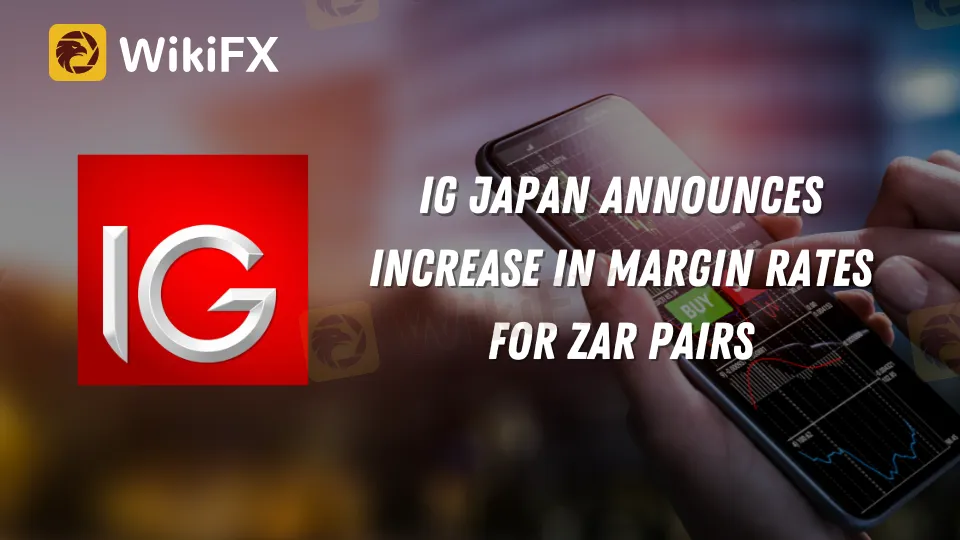简体中文
繁體中文
English
Pусский
日本語
ภาษาไทย
Tiếng Việt
Bahasa Indonesia
Español
हिन्दी
Filippiiniläinen
Français
Deutsch
Português
Türkçe
한국어
العربية
IG Japan Announces Increase in Margin Rates for ZAR Pairs
Abstract:IG Japan, a subsidiary of IG Group, will increase margin rates for Forex pairs involving the South African Rand (ZAR) from 5% to 10%, effective June 19, 2023. This change affects unsettled positions and may require adequate funds to avoid a forced loss cut.

In a recent announcement, IG Japan, the Japanese arm of global electronic trading behemoth, IG Group, has revealed an upcoming adjustment to its trading terms. The change will affect select Forex instruments, particularly those paired with the South African Rand (ZAR).
Effective Date and Changes to Margin Rates
The effective date of these modifications is slated for June 19, 2023, which falls on a Monday. On this date, IG Japan will implement a significant alteration to the margin rates applicable to Forex pairs involving the South African Rand (ZAR).
The adjustment will see the maintenance margin rate for positions held in ZAR pairs elevated. The current maintenance margin rate stands at 5%, but after the change, it will be twice that amount, resting at 10%.

Impact on Current and Future Positions
This new maintenance margin rate will have implications for customers' unsettled positions. It is important to understand that the raised margin rate will only be applicable to unsettled positions retained by IG Japans clients.
Should you hold a position in these particular instruments, it is essential to be aware that a forced loss cut might become necessary if your account does not have an adequate margin. This change could potentially lead to unintended consequences for traders who fail to maintain sufficient margins in their accounts.
Recommended Steps for Current Customers
For those who wish to preserve their existing positions post this adjustment, it is crucial to ensure that the requisite funds are available in the account. By doing so, traders can meet the new maintenance margin rate requirements seamlessly.
Ahead of the June 19, 2023 deadline, it is advisable for customers to review their positions and ensure they have the necessary funds to prevent a forced loss cut. IG Japan aims to offer ample warning time to allow clients to manage their accounts effectively.
About IG Japan and Staying Updated
IG Japan is a leading player in the world of electronic trading. As a subsidiary of the IG Group, it carries the prestigious pedigree of one of the biggest names in the industry. With a focus on offering a vast array of trading instruments, IG Japan is a preferred choice for many traders.
To remain informed about updates such as this, consider downloading the WikiFX App on your smartphone. This platform provides regular updates about the latest news in the world of Forex trading. You can download the app via this link: https://social1.onelink.me/QgET/px2b7i8n. Staying abreast of such changes is critical for maintaining a successful trading strategy in the ever-evolving financial landscape.

Disclaimer:
The views in this article only represent the author's personal views, and do not constitute investment advice on this platform. This platform does not guarantee the accuracy, completeness and timeliness of the information in the article, and will not be liable for any loss caused by the use of or reliance on the information in the article.
Read more

Why You Shouldn't Be Afraid to Trust Your Capital to Regulated Brokers
Discover why regulated brokers offer safety for your capital with oversight, security, and transparency, plus the risks of unregulated options. Invest with confidence.

PrimeXBT Expands with Stock CFDs for Major Global Companies
PrimeXBT introduces stock CFDs, allowing trading of major US stocks like Amazon, Tesla, and MicroStrategy with crypto or fiat margin options.

TRADE.com UK Sold to NAGA Group Amid 2024 Revenue Drop
TRADE.com UK sold to NAGA Group for £1.24M after a 65% revenue drop and £346K loss in 2024, marking NAGA's UK return.

Prop Trading Firms vs. CFD Brokers: Who’s Winning the Retail Trading Race?
In recent years, a new breed of retailer-focused trading firms has emerged: proprietary (prop) trading outfits that recruit individual traders to trade the firm’s capital under structured rules. Boasting low entry costs, clear risk parameters, and profit-sharing incentives, these prop firms are rapidly winning over retail traders, many of whom previously traded Contracts for Difference (CFDs) with established online brokers. As prop trading revenues accelerate, a key question arises: Are CFD brokers losing business to prop firms?
WikiFX Broker
Latest News
Prop Trading Firms vs. CFD Brokers: Who’s Winning the Retail Trading Race?
TRADE.com UK Sold to NAGA Group Amid 2024 Revenue Drop
World Trading Tournament (WTT): The Game-Changer in Global Trading
Why Binance Tightens Crypto Transfer Rules for South Africans?
BaFin Flags 5 Unauthorised Financial Platforms for Consumer Risk
Germany’s April PMI Falls Below 50 as Service Sector Stumbles
PayPal Opens Regional Hub in Dubai, Expands Middle East Reach
FINRA fines SpeedRoute for alleged rule violations
RM15,000 Profit Turned into RM1.1 Million Loss for Engineer!
New to FX Trading? Stop! Read These Warnings First
Currency Calculator


